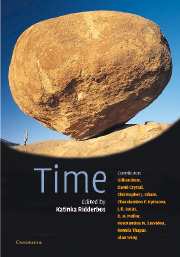1 - Time and Modern Physics
Published online by Cambridge University Press: 21 October 2009
Summary
Time is a child playing, gambling;
for the kingdom is for the simple.
HeraclitusThe subject of time
The subject of ‘time’ exercises a universal fascination. In no small part this is due to the genuinely interdisciplinary nature of the issues that arise. Thus questions about the nature of time occur in areas as disparate as physics, biology, psychology, philosophy, poetry (think of the work of T. S. Elliot), visual art, theology, music (for example, in the chanting of plainsong) and many more.
Some of these topics are covered in other chapters in this book, but in all cases – or, at least, in the more academic disciplines – a basic question is how the concept of time fits into the underlying metaphysical structure of the subject concerned. Thus, for us, a key issue is the role played by time in the foundations of modern physics. And, as theoretical physicists, we are particularly concerned with how the answer to this question relates to the various mathematical structures that are involved in the physicist's account of time.
Let us begin by remarking that there are two quite different ways in which time has been viewed by physical scientists: these are known as the absolute and relational ideas of time. In essence, the difference comes down to whether or not we grant time (and space) an existence independent of material objects and processes.
- Type
- Chapter
- Information
- Time , pp. 6 - 26Publisher: Cambridge University PressPrint publication year: 2002
- 4
- Cited by

